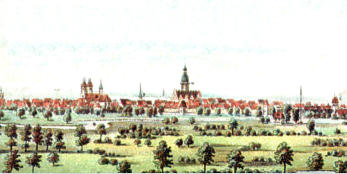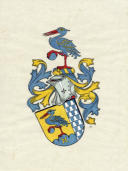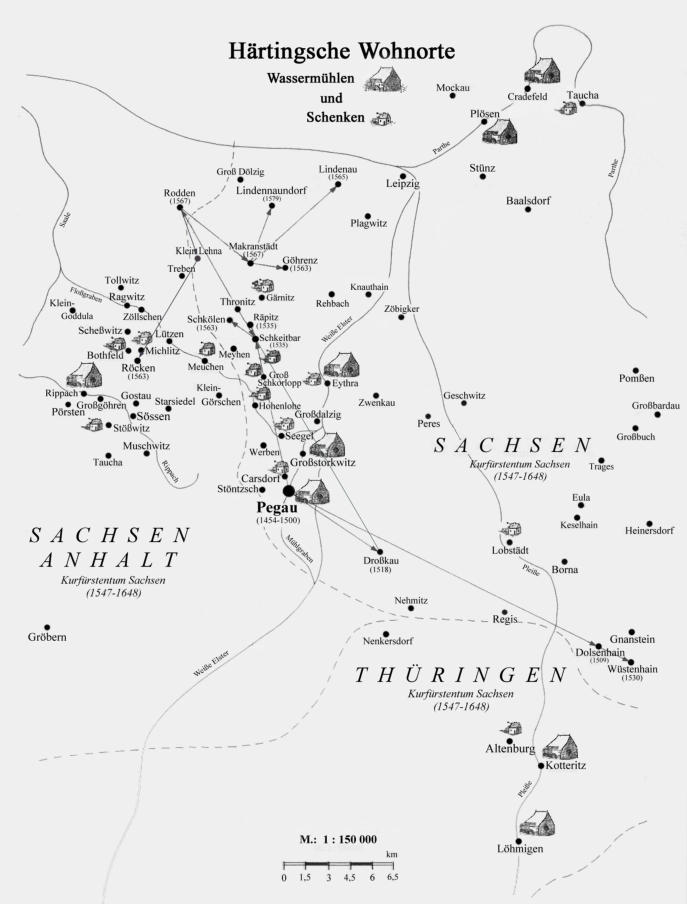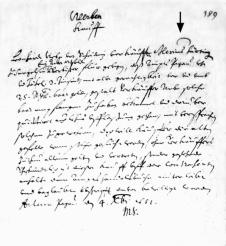
Genealogie Härting


Härting
Tribe native country
I
n
a
Pegauer
town
calculation
of
1454
a
Meistrus
Herting
is
mentioned,
the
city
of
Pegau
wage
for
powder
making
pay
off.
One
generation
later
Hans
Hearting(k)
is
performed
in
the
“floor
registers
and
tax
registers”
of
the
city
of
Pegau
from
1488
to
1501
constantly
in
the
upper
town
by
Pegau
and
in
the
country
tax
registers
of
the
office
of
Pegau
of
1518
Veit
Herting
as
a
resident
citizen
in
the
neighbouring
place
Droßkau.
In
the
office
calculations
of
Lützen
this
Veit
Herting
is
mentioned
in
1567
as
the
owner
of
a
fiefdom
property
in
Rodden
to
the
north
of
Lützen
who
had
to
pay
country
yearly
1
ßo
(shock)
beer
interest
to
his
lord Hans von Cloden, a Prussian noble family, with its ancestral seat in the village of Kläden near Salzwedel.
Tribe native country of the gender Härting, the Pegau main line, since end of the 15th century
(Sketch: Own draught H.-J. Härting)
Family history research in Saxony
First
with
Franz
Herting,
1562
farmer
in
Schkeitbar
and
in
1566
in
Rodden,
both
places
belong
to
the
office
of
Lützen,
let
yourself a strict family connection can be proved till this day in a document..
To
sum
up,
it
can
be
said
that
the
surname
Härting
from
a
family
name
has
originated
which
is
due
till
the
time
of
the
migration.
All
name
bearers
Härting
are
on
account
of
her
name
composition
presumably
of
markomannischer
descent
whose
forefathers
sat
down
during
the
migration
of
southwest
Bohemians
in
the
Roman
province
of
Raetien
(late
Bavarians)
to
the
north
of
the
Danube
around
Regensburg
and
founded
there
possibly
the
settlement
Ha(ä)rting.
Only
by
the
German
east
settlement
a
large
part
of
our
name
bearers
in
the
13th/14th
century
over
Thuringia
in
the
brands
Zeitz
and
Merseburg,
to
today's
Saxony
is
moved.
Here
Altenburg-Weissenfels
lets
itself
prove since middle of the 16th century in the triangle the gender Härting more than
Extract from the bill of sale
from the 4th of February, 1651
with the FN Härting


The
manner
of
writing
of
the
surname
"Härting"
with
the
vowel
"e"
could
keep
since
the
first
documentary
mention
in
the
year
1425
up
to
the
end
of
the
Thirty
Years'
War
about
200
years.
Only
afterwards
the
first
change
of
the
vowel
"e"
must
have
taken
place
in
an
mutated
vowel
"ä".
We
find
the
documentary
proof
of
this
manner
of
writing
in
a
bill
of
sale
from
the
4th
of
February
1651
from
him
it
arises,
that
Glorius
Härting
of
Werben
near
Pegau
one
acre
field
in
Werbener
farmland
for
30
n.
ßo
(new
shock)
from Leonhard Nebe from Scheidens near Pegau bought.
500 years in a document.






Pegau around 1625













